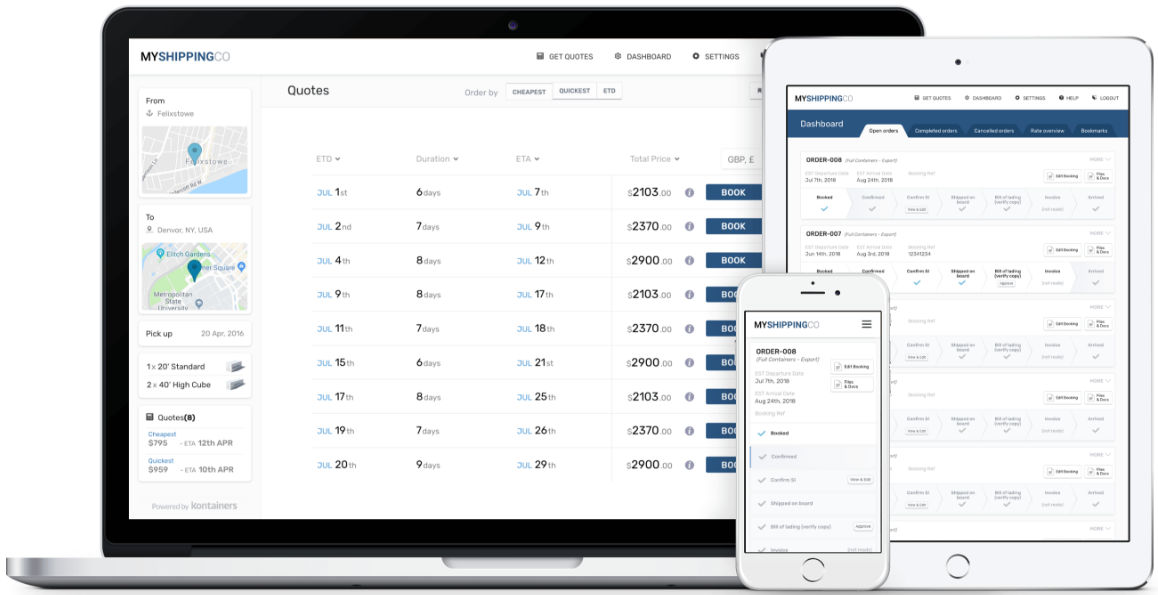Small and medium freight forwarders are facing an unprecedented turbulent time in 2020 owing to the global economic crisis due to the pandemic. There has been a greater demand for volume, faster service as well as lower costs that are pushing freight forwarders to the edge. Running the risk of failure, not having the right kind of practices in place can end up leading to a higher cut and run rate amidst shippers.
Freight forwarders that are not using the right freight management systems, can end up losing track of shipments, having roll-over of cargoes due to low volume and many other mishaps, which ends up diminishing the faith of a shipper and ultimately the demise of the forwarder. Hence, we are here to tell you about how the right freight forwarding software can help small to medium forwarding businesses thrive in these times:
- Leveraging Real-Time Information: Using APIs that are available in a freight management system, freight forwarders can easily collect and manage shipments for the customers. As opposed to earlier times when forwarders had to rely on manual status updates, by using a management system that is powered by APIs, one can garner real-time information regarding the status of the shipment at any stage. Using web-based freight forwarding software, one can leverage real-time information for better management.
- Automation of Routine Work: Automation and use of AI are the cornerstones of running an effective supply chain management. Using SaaS, mid-size and small freight forwarders can finally be able to compete with established players and also capitalise on the benefits that are provided by a digital freight forwarding platform by letting automated systems handle all the routine work, ranging from quoting to pick-up scheduling, etc. By automating the routine work, forwarders can channelize their focus upon more pressing matters, such as connecting with the customers, increase in productivity and of course cost savings.
- Using Analytics for Improvement: Using logistics ERP software, forwarders can gain access to analytics, which can provide small and medium freight forwarders with unparalleled opportunities. Leveraging analytics such as descriptive, predictive and prescriptive analytics, freight forwarders can get better insights into the task at hand as well as future challenges and then utilise all the information to achieve the desired outcome.
- Competitive Pricing: Owing to the fact that web-based freight forwarding software is generally much more affordable as compared to on-site solutions, this helps small and medium freight forwarders in being able to shift more of the expenditures from capital expenditure to operational expenditure. As a result of this, the incurring costs can be shared or funded by the shipper, wherein the value for the shareholders involved is greater than the cost of the solution.
Since a digital freight forwarding platform can be operated out of anywere with a decent internet connection, hence, freight forwarders, as well as the customers, can manage freight exceptions in a better manner.
- Building Customer Relationships: Once a freight forwarder is able to offer better rates to its shippers, more volume, of course, starts to pour in. As the cycle of sale and trust builds, small and medium freight forwarders can achieve better growth and also better customer service levels with the help of CRM for freight brokers.
As data is increasingly captured by freight forwarding platforms, freight forwarders can conduct contract negotiations with carriers that are more data-driven. Using the best CRM for logistics, small and medium freight forwarders can thus advocate for their shipper customers in a better manner, thus building upon long-term relationships and also improving upon them.
Given the uncertain times that we are living in, small and medium freight forwarders, need to work upon their working style in order to respond better and faster to the constantly changing market conditions. Inculcating and agile approach, with the help of fast freight software, is where the ideal condition lies as it pays close attention to individuals and interactions instead of focusing on set processes and tools.
By using the right logistics ERP software, agile working teams can respond to the market conditions instead of having to follow a linear plan, as they work with dynamic software as opposed to manual documentation. Thus, small and medium freight forwarders can benefit greatly by creating a flexible environment that enables faster decision-making with the aid of a digital freight forwarding platform.
If you are looking to update your IT systems and reap the benefit of digital transformation, reach out to us and we will be more than happy to provide you with a demo.
